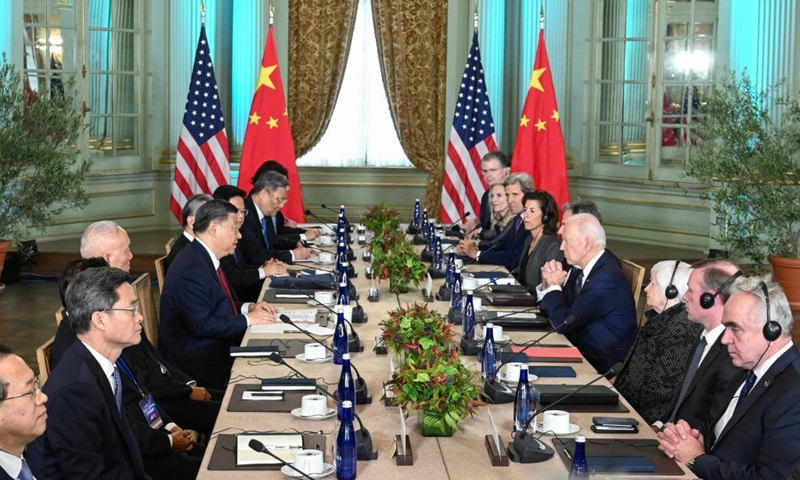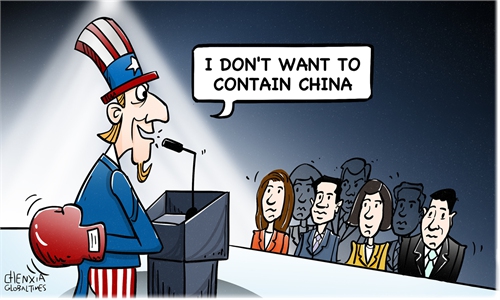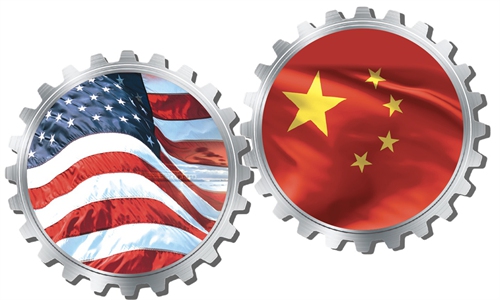Assessing the achievements and changes following China-US summit in San Francisco

Chinese President Xi Jinping meets with U.S. President Joe Biden at Filoli Estate in the U.S. state of California, Nov. 15, 2023.(Photo: Xinhua)
The meeting between the Chinese and American heads of state in San Francisco concluded this morning Beijing time. Similar to the Bali summit last year, there is no joint statement. However, both countries released lengthy official readouts to the public, characterizing the meeting as "candid" and "constructive," while listing the important consensus that was reached.The two sides agreed to promote and strengthen bilateral dialogue and cooperation in such areas as China-US government talks on AI and the establishment of a working group on counternarcotics cooperation. They agreed to resume, on the basis of equality and respect, high-level communication between the two militaries, the China-US Defense Policy Coordination Talks, and the China-US Military Maritime Consultative Agreement meetings, and to conduct telephone conversations between theater commanders. They also agreed to work toward a significant further increase in scheduled passenger flights early next year, and expand various bilateral exchanges in education, overseas students, youth, culture, sports and between the business communities.
This meeting has helped adjust the atmosphere of China-US relations and achieved the aforementioned outcomes, which can be considered quite remarkable.
Both sides also openly expressed their positions on major differences. President Xi elaborated on China's principled stance regarding the Taiwan question, urging the US to take real actions to honor its commitment of not supporting "Taiwan independence." "China will realize reunification, and this is unstoppable," Xi said during his summit meeting with Biden.
Xi also criticized US unilateral sanctions against China, saying that stifling China's technological progress is nothing but a move to contain China's high-quality development and deprive the Chinese people of their right to development. China's development and growth, driven by its own inherent logic, will not be stopped by external forces, Xi continued.
From the Readout released by the White House, Biden defended the US' Indo-Pacific strategy, the so-called freedom of navigation and overflight as well as the practice of forming small circles. However, both the US and China have made extensive use of expressions including "the two leaders underscored," "the two leaders welcomed," "the two leaders reiterated." The readout released by China's Foreign Ministry contains six such expressions in the common tone of the two sides and the US document shows eight such expressions. These paragraphs, which resemble the tone of a "joint statement," indicate that although the two sides still have differences on some key issues, they have indeed demonstrated a common desire to ease tensions between the two countries, to contain the further festering of differences and to maximize the positive aspects of the relationship.
The most important thing for China and the US at present is to prevent further deterioration in bilateral relations, in particular to prevent military friction and conflict in China's coastal waters and avoid fatal miscalculations. Only by stabilizing the overall situation as well as discovering and accumulating positive aspects in their dealings with each other, rather than spiraling downward, will it be possible to gradually feel out the way for peaceful coexistence between the two great powers in the new era.
It is worth noting that the meeting created a positive atmosphere, which is of special significance at a time when mutual suspicion deepens in China-US relations and people-to-people exchanges wane. The two heads of state talked and walked together after the meeting, Biden walked Xi all the way to his car. This gives the world a reference point to interpret the nature of China-US relations.
There is still much hope for increased communication and cooperation between China and the US in certain mutually beneficial areas, as well as maintaining stability in times of difficulty. The summit between the Chinese and US heads of state in San Francisco provides a general expectation for this. Concerns about military friction and uncontrollable shocks between China and the US will be alleviated due to the success of this summit.
The most worrisome aspect is that the political environment in the US is extremely complex, and there are destructive factors that are beyond control that may hurt the China-US relationship. US leaders often appear in the media, making impromptu remarks that are not precise and are often exploited by troublemakers. The US lacks the willpower, determination and consistency to manage the China-US relationship. This issue will struggle with the US' actual interests in stabilizing relations with China. I hope that time will prove that the US is rational and that American society will eventually realize that peaceful coexistence with a powerful China is the best and only choice for the US.
The author is a media professional. opinion@globaltimes.com.cn



